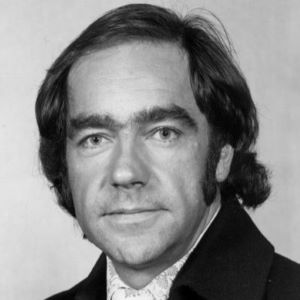Alumni Remembered - Professor Derek Crowther (1937-2024)
An appreciation for the late Professor Derek Crowther FRCP FRCR (Medicine MBBChir, 1963), Professor Emeritus in the School of Medical Sciences, University of Manchester, who passed away on 5 February 2024.

Derek Crowther was proud to be a Barts Man and both the Medical School and Hospital have very good cause to be proud of him, a star of the 60s and 70s for his contribution to the practice of Medicine, particularly the nascent speciality of Medical Oncology at the time at Smithfield, at The Christie Hospital in Manchester, and internationally.
With no family history of Medicine, having read Natural Sciences at Clare College, Cambridge as a Foundation Scholar, he married Margaret, his soulmate, in 1959, and spent a year studying the poliovirus at Baylor University in Houston, Texas and enjoying America as a Fulbright Scholar, then entered Barts in 1960, qualifying MB, BChir (Cantab) in 1963.
It was as House Physician to Sir Ronald Bodley Scott, The Queen’s Physician, whose personal interest was ‘clinical haematology’ with Gordon Hamilton Fairley as Chief Assistant (Senior Registrar), that his interest in malignant disease, particularly Leukaemia and Lymphoma was kindled. After further training posts at Barts and The Royal Postgraduate Medical School and gaining the MRCP, he was appointed to a Wellcome Research Fellowship at Chester Beatty Research Institute Laboratories where he completed his PhD thesis about the immune response in Hodgkin’s Disease under the supervision of Gordon Hamilton Fairley and Peter Alexander.
In 1968, he returned to Barts as Chief Assistant himself to Sir Ronald Bodley Scott. It was then that his potential as an academic physician became apparent. Dressed as if straight from Carnaby Street with hair on shoulders and rings on his fingers ("Lister, please tell that student to have a haircut, I can hardly ask Derek", a request from RBS to me one day), he presented a splendid aesthetic contrast to the Queen’s Physician. They got on like a house on fire with mutual respect for their regard for and insistence upon excellence in the practice of Medicine. There was nothing frivolous about Dr Crowther’s approach to patients or staff. He was an absolute professional. His boundless energy, enthusiasm and inquisitiveness were reflected in his inspirational teaching of both undergraduates and postgraduates.
Day-in-day-out for four years, against the background of the routine treatment of general medical emergencies, he was responsible for coordinating the management of a large practice of patients with haematological malignancy. At a time of exciting therapeutic developments and greatly encouraged by his Chief, he led and published in 1970 the first trial of the combination of an anthracycline antibiotic with cytosine arabinoside for Acute Myeloblastic Leukaemia. It is still in use more than half a century later.
With the establishment of the ICRF Medical Oncology Unit in 1971, with Gordon Hamilton Fairley as director, Derek became Senior Lecturer. In this capacity, he played a critical role in the development of the strategy of conducting clinical trials of experimental therapy in conjunction with related studies in the laboratory, the design and initiation of specific trials of combination chemotherapy for lymphoma and immunotherapy for acute leukaemia, with meticulous attention to the prospective collection and recording of data before the era of computerisation. Central to this strategy was his appreciation of the need for collaboration and the close links developed by Gordon Hamilton Fairley at the Royal Marsden Hospital and Institute of Cancer Research, especially with Ray Powles and Peter Alexander. If this was not enough, in the real world dominated by doctoring, he played a central part in the initial establishment and early organisation of Medical Oncology as a specialty in the United Kingdom.
In 1973, The Cancer Research Campaign opened the first Regional Oncology Unit at the Christie Hospital in Manchester. With its excellent radiotherapy service and the Paterson Research Laboratories in an adjacent building and secure research funding, this provided a terrific opportunity for an aspiring head of department in a burgeoning field. Starting from scratch, with characteristic vigour, he continued where he had left off at Barts. He gathered together a group of like-minded clinical academics who he encouraged to subspecialise, which was good for the patients and also for trainees needing experience across the spectrum of malignancy. He was very far-sighted about a holistic approach to care involving nurses and social workers. He recognised the need for close interaction with radiotherapists, radiologists, pathologists, as well as the nurses and social workers ensuring that clinical research covered the whole of ‘care’. He built close relationships with groups at the Paterson, thereby maximizing the opportunity for valuable translational research, greatly to the benefit of clinical research fellows. And he fostered collaboration with Barts and other institutions.
Over the course of the 20-odd years that he was at the helm, Derek created and oversaw an environment in which the systemic management of malignant disease and research in the field was brought to a level which is internationally respected today. Not only that, he played an important role in the continuing evolution of the specialty of Medical Oncology, its relationship with Clinical Oncology (Radiotherapy), Surgical Oncology and Haematology and also the challenge of the creation of NHS in addition to academic staff. These contributions were recognised when he was elected President of The Association of Cancer Physicians.
Early retirement, brought on by a debilitating auto-immune disease may have resulted in him stopping work, but his inquisitiveness about everything was undiminished. Even his obsession with cosmology and black holes still left him time for new interests in the university and 'helping' Margaret. with whom he was blessed for 65 years, with her weaving, until his mind began to wander.
Derek Crowther was a very special person, to patients, colleagues, particularly juniors, friends and family. He was an inspiration to us all, most especially those lucky enough to know him well.
Professor Andrew Lister, Emeritus Professor, Barts Cancer Institute